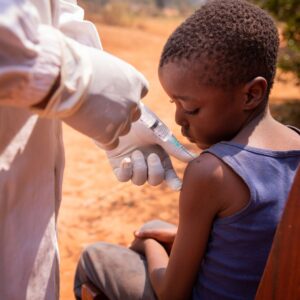The Government of Bangladesh, with support from UNICEF, Gavi, and WHO, launched a nationwide Typhoid Conjugate Vaccine (TCV) campaign on 12 October 2025, aiming to vaccinate approximately 50 million children aged 9 months to under 15 years. Bangladesh becomes the eighth country globally to introduce TCV, a life-saving vaccine designed to protect children from deadly typhoid fever. The inaugural session took place at Farid Uddin Siddiqui High School in Dhaka, where children from Sir Salimullah Muslim Orphanage were among the first recipients.
Health Adviser Nurjahan Begum highlighted the campaign as a continuation of Bangladesh’s successful immunisation history, noting that the Expanded Programme on Immunization (EPI) prevents an estimated 94,000 child deaths annually. With TCV, the country aims to prevent an additional 6,000 deaths each year, targeting 100 percent coverage to ensure strong population immunity and a reduction in typhoid-related morbidity and mortality. Typhoid fever remains a significant public health concern in Bangladesh, with children accounting for nearly 68 percent of typhoid-related deaths.
Dirk Gehl of Gavi emphasized that the campaign represents the largest TCV rollout worldwide and is a critical step in combating drug-resistant typhoid. The initiative also demonstrates Bangladesh’s commitment to protecting vulnerable children and supporting routine immunisation, serving as a model for other high-burden countries. Gavi supports co-financing for nationwide TCV introduction and fully funds a one-time catch-up campaign, covering vaccines, supplies, and operational costs.
The campaign is being implemented in two phases. The first phase, from 12 to 30 October 2025, targets educational institutions nationwide, including schools, madrasas, and English-medium schools. The second phase, from 1 to 13 November 2025, will reach children through EPI fixed centers and 120,000 outreach sites. UNICEF has supplied over 50 million TCV doses and provided digital support via the VaxEPI app for real-time registration, microplanning, and monitoring, with approximately 18 million children already registered.
UNICEF Representative Rana Flowers underscored the importance of vaccinating all eligible children, particularly those out of school or living in informal settings, while WHO Representative Dr. Ahmed Jamsheed Mohamed highlighted the role of TCV in reducing antibiotic resistance and saving lives. Following the campaign, TCV will be included in routine immunisation for infants under one year starting in 2026, ensuring sustained protection for future generations.
The campaign’s launch followed advocacy efforts, including a National Advocacy Meeting and press briefings, to secure political support and community participation. The initiative is led by Bangladesh’s Ministry of Health and Family Welfare and the EPI, with continued support from international partners such as the U.S. Government, Global Affairs Canada, the Asian Development Bank, the Government of Japan, the Embassy of Sweden, and the UK Foreign, Commonwealth and Development Office. UNICEF, WHO, and Gavi remain committed to ensuring that every eligible child in Bangladesh receives the TCV vaccine.







